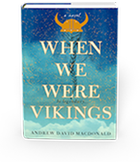
Every so often a character transcends the page, leaping into readers' hearts; when this phenomenon coincides with the debut of a superbly talented author such as Andrew David MacDonald, it's even more extraordinary. In When We Were Vikings, MacDonald's captivating, beautifully written and witty novel, he introduces to the literary world an unforgettable protagonist.
Twenty-one-year-old Zelda has an intense fascination with Vikings and a diagnosis of fetal alcohol spectrum disorder. Both contribute mightily to her quirky, slightly naïve but almost always upbeat approach to life. All of this immediately endears her to readers. In the spirit of her revered Viking heroes and heroines, Zelda has embarked on a quest to become legendary. According to her favorite book, Kepple's Guide to the Vikings, she already has much of what she needs to accomplish her goal:
A powerful weapon? Her authentic Viking sword.
The love of a fair maiden? Zelda is in love with her boyfriend, Marxy, a young man who is also intellectually challenged and who agrees that they are ready to become sexually intimate.
A wise man? Her psychologist, Dr. Laird, has the credentials befitting that description, as does Viking expert Dr. Kepple, whom Zelda regularly e-mails in search of guidance on living as a modern-day Viking.
A tribe? Despite their unconventional circumstances, Zelda's family meets that criteria. She lives with her older brother, Gert, a well-intentioned but overwhelmed college student doing his best to care for Zelda after their mother's death from cancer, their father's unexplained disappearance, and her brief stay with an abusive uncle. Gert's on-again, off-again girlfriend--whose given name is Annie but whom Zelda calls AK47--also takes a protective, maternal role in Zelda's life, demonstrating that sometimes it is necessary to build one's own tribe with people who aren't related by blood.
A villain that she must defeat? When she discovers that Gert hasn't been attending his college classes--jeopardizing his scholarship in the process--and may be involved in some criminal activity, Zelda decides that this is her opportunity to take on a villain. "I know that people do things they do not want to do to contribute to the hoard. It is like a sacrifice, only instead of lighting things on fire or killing animals to make Odin and the other gods happy, you sacrifice yourself, and instead of doing the things you want to do, you have to do things for other people." Combating her villains also means defying her brother, but "sometimes the heroes of legends have to break the rules in order to save the people they care about."
With a fast-paced and engaging plot, MacDonald makes it easy for his readers to care deeply--and immediately--about Zelda. As the humorous and bittersweet storyline of When We Were Vikings progresses, readers will feel compassion for Zelda, while enthusiastically cheering her on to victory against the perceived dangers in her life.
Those perceived threats derive from other humans--namely, a drug dealer to whom Gert owes money--as well as from the discrimination and stigma that society perpetrates against people with disabilities. When We Were Vikings succeeds in shattering two gargantuan (one of Zelda's favorite words from her Word of Today calendar) misconceptions about people with disabilities: their capacity as employees and as sexual beings with the same desires and feelings as everyone else. When Zelda applies for a job at the local library, she senses her interviewer's reluctance to hire her, and is told that no positions are available. Similarly, when Zelda and Marxy announce their desire to have sex for the first time, the other adults in their lives respond with a range of emotions, from resistance to compassion.
"I also believed that part of my legend was to show the world that people like Marxy and me can be powerful together, the way that Gert and AK47 are powerful, and that we can create a tribe of our own one day," Zelda says. The beautifully creative way that their loved ones support them in taking this next step is a testament to MacDonald's skill, and his realistic and respectful handling of this theme marks him as a writer to watch.
The coming-of-age themes in When We Were Vikings are universally relatable. Like Zelda, many of us want our lives to have meaning and to be the stuff of legends. But, as Zelda learns, our journey toward greatness is uniquely our own, and it often doesn't look like the linear or logical outline in a guidebook. Rather, the way to become legendary is, as Zelda observes, "about taking all of the power that the gods have given you and making the most out of them."
With his stunning, heartfelt debut, Andrew David MacDonald has accomplished exactly that. When We Were Vikings sets him on a trajectory for a most legendary writing career. --Melissa Firman

